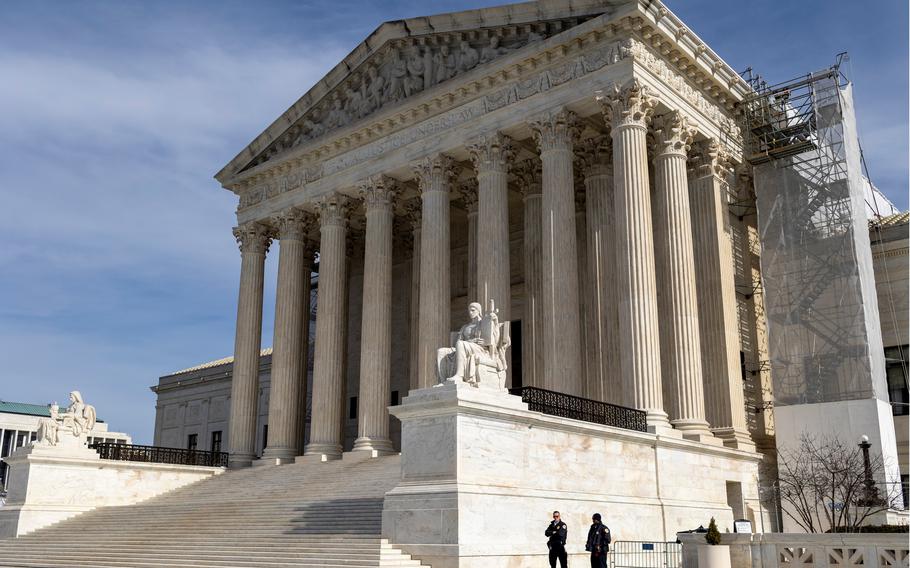
The Supreme Court building in Washington. (Eric Kayne/Stars and Stripes)
WASHINGTON — The Supreme Court has rejected an argument by two veterans that the Department of Veterans Affairs had a duty to grant their claims for post-traumatic stress disorder when the evidence showed the decision to be a close call.
In a 7-2 ruling, the court said the VA does not need to apply the “benefit-of-the-doubt rule,” a standard of proof that favors the veteran when there is a balance of positive and negative evidence.
The decision supported the findings of the VA claims specialists who denied the veterans disability claims.
One veteran sought a claim for PTSD, a mental health condition diagnosed in individuals who’ve experienced trauma. The other petitioned for a higher disability rating for his military service-connected PTSD.
The high court supported the federal government’s argument that the appropriate standard of review “depends on whether the challenge is factual or legal in nature.”
Justice Ketanji Brown Jackson, voting in the minority with Justice Neil Gorsuch, wrote in the dissent that the U. S. Court of Appeals for Veterans Claims, also known as veterans court, will continue “rubber-stamping” denials of VA claims instead of delving into the evidence.
The Supreme Court reviewed a pair of similar cases — Bufkin v. Collins and Thornton v. Collins. Doug Collins, named as the defendant in the cases, is the VA secretary.
Joshua Bufkin served in the Air Force from 2005 to 2006 and Norman Thornton is a Gulf War Army veteran who served from 1988 to 1991.
Bufkin obtained a “nonprejudicial hardship discharge” from the military after he said his wife threatened suicide unless he left the service, according to court documents. He filed a claim for PTSD related to his military service and the marital strife that it caused at home.
Bufkin was denied disability compensation for PTSD, after his doctors disagreed on the diagnosis, according to court records.
Thornton had sought a higher disability rating for his established medical diagnosis of PTSD but was denied. He had been rated with a 50% disability but sought a higher rating, arguing his mental health condition affected his ability to hold a job.
“Petitioners are veterans who applied for service-connected post-traumatic stress disorder (PTSD) disability benefits and were dissatisfied with the VA’s resolution of their claims,” the Supreme Court wrote in its syllabus of the case.
Attorneys for the veterans argued the veterans court had a duty to re-evaluate the evidence in the veterans’ cases based on the benefit-of-the-doubt rule. But the Supreme Court said the veterans court can overturn a decision only when there is clear error.
The veterans court has the authority to decide relevant questions of law and set aside VA findings that are “arbitrary, capricious, an abuse of discretion, or otherwise not in accordance with law,” according to the majority opinion of the Supreme Court.
The court stated in its opinion that Congress provides veterans a wide range of benefits, including compensation for disabilities caused or aggravated by active-duty military service. The VA administers the laws that provide for those benefits
Veterans can appeal denials of VA claims to the Board of Veterans’ Appeals, which reviews the contested claims. If the appeals board rules against the veteran, the disputed claim can be challenged before the U.S. Court of Appeals for Veterans Claims, or veterans court.
Attorneys for the veterans argued the benefit-of-the-doubt rule has been used to decide disability payments for veterans for more than a century. But the federal government countered the role of veterans court is to review disputed cases for errors.
Bufkin and Thornton filed challenges in veterans court after their cases were rejected by the veterans appeals board.
The veterans court has exclusive jurisdiction to review final decisions of the board, according to court documents.
In both cases the veterans court agreed with the denials made by the VA claims specialists.
When the veterans later challenged the rulings in U.S. Court of Appeals for the Federal Circuit, the court sided with the government and said the decisions were properly reviewed and handled.
“We hold that the VA’s determination that the evidence is in approximate balance is a predominantly factual determination reviewed only for clear error,” Justice Clarence Thomas wrote in the majority opinion.